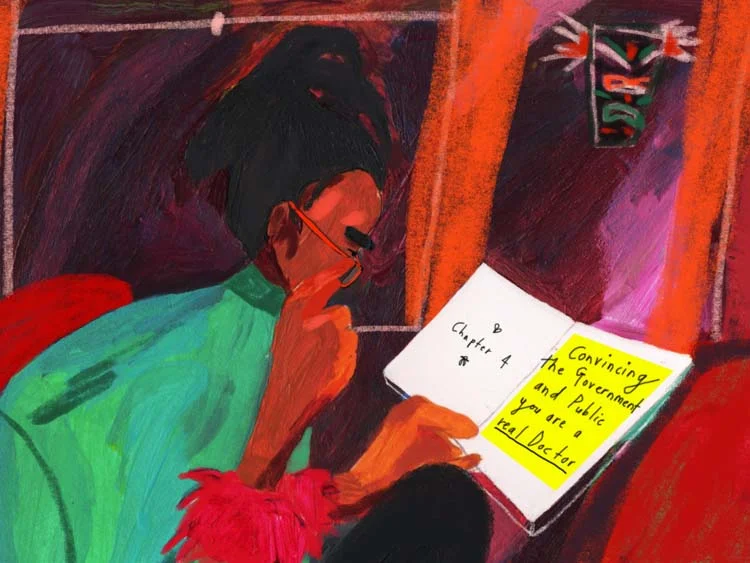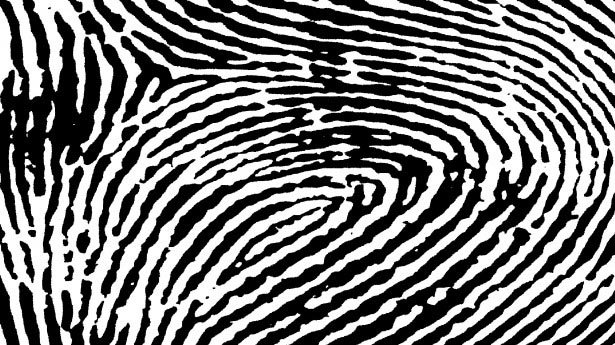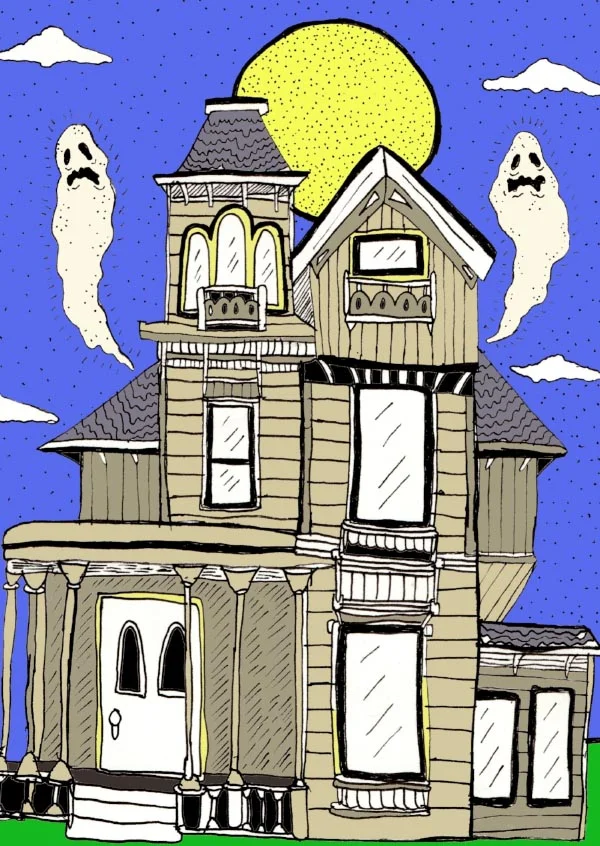Fed Up With Traditional Medicine? Try a Witch Doctor
In Canada, there’s an organization that casts spells and manipulates spiritual energies. Is it for real or just a comical sham?
By Deanna Rose Morgado
Thanks to Hollywood films, archaic stereotypes, and a particularly ill-informed 1950s song, witch doctors are often viewed as primitive, other-worldly beings known for wearing ceremonial headdresses and sticking bones through their noses.
From Alvin and the Chipmunks to The Muppet Show, there’s no shortage of cultural reinterpretations of the ancient healers, many of whom are often depicted as evildoers or shams.
Nowadays, most modern societies have done away with witch doctors, opting for science and medicine over spells and rituals. But they’re still out there. In countries as varied as Uganda and Indonesia, people continue to consult witch doctors for guidance and healing, and local publications often write about their magical feats.
And then there’s the Canadian Association of Witch Doctors. Formed a decade ago by a group of graduate students that were fed-up with Canada’s traditional healthcare system, it has now has grown into a 125-member organization that treats an assortment of ailments and maladies using “non-science based medicine” and a “magical, spiritual energy” called loco.
Because it doesn’t have a brick-and-mortar location, CAWD exists largely online and its website is a treasure trove of both useful and inane information. The courses listed in the Witch Doctor National Curriculum sound like they could be taught at Hogwarts, with classes such as “Levitation Skills,” “Martian Medicine and Extraterrestrial Applications,” “Mystical Beasts and Snakes I and II,” “Zombie Management,” and “Raising the Dead.” Also listed are courses that have seemingly nothing to do with witch doctoring, including “Hippie Handicrafts,” “Hockey Skills and Appreciation,” and “Latvian Dancing.”
Peruse the website’s FAQ section and things get even more befuddling. Witch doctors at CAWD, you’ll learn, are religious; that is, if you consider “pastafarianism” a religion. “[We] follow the Great Noodly One: the Flying Spaghetti Monster,” it reads. “We are naturally his advocates as we, too, have a healthy respect for pirates.”
You’ll learn that a typical exam with a witch doctor lasts about one hour and includes gathering information about your bank balance before a “made-up physical exam” is performed. Treatments from CAWD are also completely gratis, although “you are of course free to bestow expensive gifts upon your practitioner if completely satisfied.”
Delve further into CAWD’s online resources, and you’ll discover how zany and confusing the organization truly is. With PDFs of both its Code of Ethics and Code of Conduct, it’s clear someone put a lot of time, thought, and energy into building the website. But when you start reading them and seeing lines like “These standards are … to ensure responsible, safe, and meaningless care to patients,” it’s hard not to ask yourself, “Is this all just a joke?” After all, there is an upper-level course in their curriculum called “Capstone: Convincing the Public and Government You Are a Real Doctor,” and the answer to the question “How Does Loco Energy Work?” reads simply, “It doesn’t.”
Is this for real? A screenshot of some of the questions and answers listed on the Canadian Association of Witch Doctors' website. (Photo: CAWD)
So is CAWD a real organization? Yes and no. It’s possible they straddle the line between serious and just-for-gags not because what they’re doing is fake, but because it’s technically illegal.
In Canada, there is a 126-year-old law called Section 365 that criminalizes practicing witchcraft, among other crafts, such as sorcery and fortune telling. Meant to spare people from getting scammed by posing psychics and fake services, the law is still in effect today, although it might not be for long. Earlier this year, the House of Commons passed a bill to repeal Section 365 from the criminal code. Still, that hasn’t happened yet and it might explain why CAWD’s services are entirely free.
With this in mind, OK Whatever reached out to Dr. Wen Shortipsy, CAWD’s director and the author of most of the content on their website. What ensued was a strange and fishy interview that raised so many new questions that a second follow-up interview was required in order to write this article. As far as we can tell, Dr. Shortipsy was not deliberately trying to be vague in his answers to our questions; that’s just how things are when you’re discussing the world of witch doctors.
At the end of our first interview, he told us he’d “cast a spell” in OK Whatever’s favor. Here’s hoping it works, although we’re not holding our breath.
OK Whatever: Can anybody become a witch doctor or at least a part of the Canadian Association of Witch Doctors (CAWD)?
Dr. Wen Shortipsy: Yes, absolutely. And we have a very rigorous education and training program which is documented on our website for anybody who wants to be a practicing witch doctor. Believe it or not, we actually get a lot of emails from quite crazy people who want to be witch doctors, who want to cast spells, and things like that. But to join the power and become a witch doctor, we have our doctoral program and then you have to pass our examination, which is a challenging exam. But if you have previous qualifications you could just take our exam and skip the curriculum because you already know it. If you're just interested in supporting witch doctors and becoming an honoree witch doctor, you can get a certificate to say you're a supporter and honorary witch doctor. But to actually qualify as a witch doctor is quite an undertaking. You need a doctoral qualification just like any naturopathic doctor.
According to the Canadian Association of Witch Doctors’ website, it could take about four years or so to become certified. Is that right?
That's right. We have a number of specialist programs, some of which start with the foundational science. They do ethics, jurisprudence, things like that. We modeled it on a naturopathic program, so it's very, very similar to what you would do if you wanted to be a naturopath. The basic differences are that witch doctors use a powerful energy called “loco,” whereas naturopaths use some other magical stuff. Loco is a form of energy that has existed for a millenia, and it's basically like a life force energy that flows through every living being. Later in their training, witch doctor trainees focus on a handful of more magical studies, too, such as levitation and parapsychology. We have some Canadian courses as well, such as bear wrestling...
I know there’s a class called “Zombie Management,” but witch doctors must learn bear wrestling, too?!
Absolutely. This is an essential skill for a Canadian witch doctor master.
Really? How so?
Well, obviously in Canada we have a number of practitioners who are working in the far north and rural areas. They frequently encounter bears and have to deal with them, and often we find the magical solutions take too long. So instantly wrestling them seems to be a better solution for us.
As a large organization, are there any meetings or regular gatherings where members discuss matters of the organization in-person? Or is it based purely online?
We have meetings, but only for fully qualified witch doctors. We hold those on Pluto every three years.
On Pluto every three years?
Yes, that's correct.
How does that work?
Well, it works very well. There's not a lot up there to disturb us. We find we can relax a bit and chill out in the cool atmosphere there, or lack of atmosphere, and we use our teleportation skills that come with the advanced loco training to get there.
What happens if a witch doctor uses their powers for evil? In CAWD’s code of ethics, which is published on the website, it states that disciplinary action can range from a warning to “castigation to the fiery pits of oblivion in the witch doctor afterlife.”
Well, we've never had to use that sanction, I'm glad to say. But if a witch doctor were to completely disregard the code of ethics and actually charged patients and used their powers for nefarious purposes, in that case, we would have to have a council, a disciplinary meeting, and a very rigorous process. As you can see, we have a code of ethics and a code of conduct, and anyone falling short of that can result in one of those severe penalties. But we witch doctors are generally very benign and are a pleasant people, and we haven't had any issues arising with that.
So no witch doctors are going rogue or anything like that?
No. We’re unlike some of our naturopathic colleagues here, one of whom was recently caught using rabid dogs’ saliva remedies for patients.
Wow. So what does a typical treatment from a witch doctor look like?
First of all, we make it very clear, unlike fellow alternative health practitioners, that none of our therapies actually work. We make that very clear at the start. What we'll then do is a very substantive assessment on the individual; a holistic assessment where we'll look at every aspect of their life. We’re particularly interested in their bank balance and how much money they've got to pay us, although we don't actually charge for our services. What we do is request a donation or beneficence to their witch doctor. And then, after that, we'll make up some sort of spell and then just chant it and away they go.
OK, so once you do the initial assessment on a patient, you put something together for them, spell-wise, and then they're done?
Absolutely, yeah. We'll use loco energy to bring power to bear on whatever problem they have. A chant, a spell, and then away they go. And of course it doesn't work but that's fine as long as they feel better about the whole thing.
What are some of the reasons why people visit witch doctors? Do you take patients suffering from depression, anxiety, or mental illnesses?
Strangely enough, no. The sort of requests we usually get are from people who want spells put on their husband or spells removed because they believe their husband or a relative has put a spell on them. But what we generally do is refer these people who have actual mental ailments to physicians because obviously they have some real health issues that could actually be helped by a mental health assessment.
You’ve touched on this subject already, but I find it fascinating that CAWD openly acknowledges that its practices don’t work at all. In fact, on the website’s homepage it says, “We openly assert that none of our therapies actually work.”
That's why witch doctors are superior to all alternative health therapies, because we actually make that very clear on our front. I don't think you'll find any other alternative practitioner who will sort of own up to that claim. We are very strongly putting that forward in our practices.
But doesn’t that hurt business and the organization’s credibility?
Just like a naturopathic, chiropractic, or reiki treatment, our services work on principles that are beyond the scope of conventional science. We work in a magical realm. The loco is a very powerful thing. We are able to manipulate it very carefully to make sure patients can receive the maximum benefits, which are of course nothing.
I imagine past patients would be able to attest to a witch doctor’s magic working for them or not. How many patients do you see a year?
Zero. But we get about 100 crackpot requests and 50 genuine inquiries a
year, those of which we refer to physicians.
I also noticed that on CAWD’s website, it says that “luxury German cars” are an acceptable gift in exchange for treatments. Do these kinds of extravagant gifts happen often? And why is accepting more lavish gifts deemed appropriate but not money?
Because, basically, the emphasis is on it being a “gift.” Unfortunately, very few patients have offered us luxury German cars or Swiss watches. But we are continuing to sort of campaign that these are the preferred gifts of witch doctors. Basically, we find that we cannot charge for our services, because of course they do not work, and this places us in a legal position. Other practitioners have managed to get away with this, but we can't really figure out how they do it. So for us, if people feel they have really benefited from the power of loco and a consultation with a witch doctor, the best thing for them to do is make out a gift to their witch doctor. We specify this can be any amount depending on their means, but obviously we do have consultations with people who are super rich and billionaires. So if we do that, they are very welcome to offer us, you know, Gulfstream jets. But as of right now, our typical donation amount is $0.
Most of the witch doctors’ names listed on CAWD’s website are incredibly non-traditional, such as Dr. Juju Bamboozle Nosebone WD or Dr. Hannibal Lecter WD. Do you use these names for fun or is there a deeper meaning behind them?
That's a very good question. The problem with witch doctors, as you probably know from your own knowledge of history, is they've been persecuted over the years through witch trials and witch hunts. So obviously our practitioners have to use secret names. They choose their name upon graduation and it's a very powerful ceremony where they choose a name that reflects their spiritual practice. Usually, a name is suggested to them by a spiritual guide. That becomes their alter ego name they use for their practice and professional engagements.
Being a witch doctor sounds a lot like a form of witchcraft. Is there any connection?
That is something completely different. We are in no way associated with the traditional healers or practices of witchcraft. We are purely manipulators of loco energy, which is a magical form — a spiritual entity — that, to be honest, most people don't even understand exists. But witch doctors have mastered the way to manipulate it.
Looking into the future, what is CAWD’s main goal to achieve next?
To become a registered health profession in British Columbia, just like our brothers and sisters the naturopaths, who managed to do so. Denying witch doctors the same legal status is a human rights issue, as both professions are based upon identical magical beliefs. Other professions — such as some traditional Chinese medicine and things like that — have managed to achieve that regulatory status. Unfortunately, it’s a $2,000 application fee to be considered for registry, which we haven't managed to get yet.
But we're working towards that and there's no reason why we shouldn't be able to get there in the future.







Ghosts sometimes come free with your purchase when you shop second-hand.